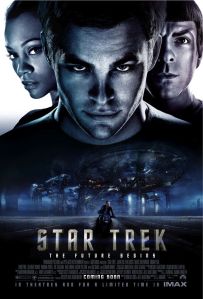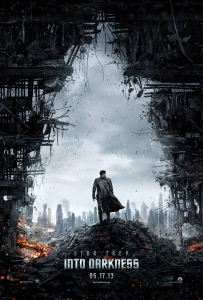It’s been a long road getting from here to there
by Thom Yee
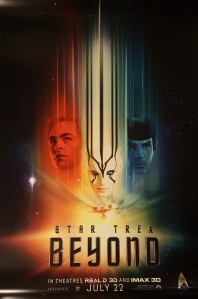 We’ve been pretty fond of J.J. Abrams’ rebooted Star Trek here at GOO Reviews, with 2009’s Star Trek, the first entry in what’s now officially known as the Kelvin Timeline, still a standout favourite among the many movies we’ve covered here. Generally well received by critics and fans, it’s the movie that revitalized Star Trek as a viable franchise after it had been, more or less, run into the ground, its last ongoing series, Enterprise, not even airing on a major network as it eked out four seasons-worth of episodes to an audience that had long been growing tired and apathetic towards the whole… well, enterprise (and let’s not even get started on that opening theme song).
We’ve been pretty fond of J.J. Abrams’ rebooted Star Trek here at GOO Reviews, with 2009’s Star Trek, the first entry in what’s now officially known as the Kelvin Timeline, still a standout favourite among the many movies we’ve covered here. Generally well received by critics and fans, it’s the movie that revitalized Star Trek as a viable franchise after it had been, more or less, run into the ground, its last ongoing series, Enterprise, not even airing on a major network as it eked out four seasons-worth of episodes to an audience that had long been growing tired and apathetic towards the whole… well, enterprise (and let’s not even get started on that opening theme song).
Star Trek’s sequel, Star Trek Into Darkness, came out four years later, and while we were also quite fond of it and it too was quite well received by critics, the fullness of time has revealed a deep-seated disdain for Into Darkness, especially among long-time fans of the series. With criticisms of the movie’s plot mechanics, its sometimes overt Star Wars vibe, its hackneyed repetition of well-known moments from Star Trek history, and the disappointing new version of one of The Original Series’ most beloved villains (Khaaan!!!!), Into Darkness’s weaknesses have gradually but surely cast a dark shadow almost large enough to envelop this entire reboot initiative.
It’s under this shadow that Star Trek Beyond debuted last week, in the midst of a fairly weak summer movie season full of disappointing franchise sequels and reboots, and with Justin Lin, late of the Fast and Furious movies, taking over the director’s chair and the movie’s first trailer leaving a bad taste in people’s mouths, it didn’t exactly feel like there was a lot of (if any) optimism surrounding Beyond’s release.
There probably should have been.
What’s it about?
With three years of its five-year mission to explore strange new worlds and seek out new life and new civilizations having passed, life has gradually become less about boldly going and more about everyday routine for the crew of the starship Enterprise, particularly for its captain, James T. Kirk (Chris Pine). Despite seeking a vice admiral position that would see him leaving his space-exploring duties behind, Kirk is nevertheless called back into action, sent on perhaps one last mission when an alien seeking help draws the Enterprise into an unexplored nebula. But what Kirk and his crew find there will be unlike anything they’ve ever seen before. Which is the whole point of the thing.
Y’know, for a major franchise, it’s almost shocking how little these Star Trek movies actually make. Say, for instance, that you’re a hardcore Trekker (or Trekkie, sigh) and you always have been, especially to the exclusion of its chief rival, the hated Star Wars movies, and you’ve been backing up that position for most of your nerdy life, arguing that yours is the superior sci-fi experience, yours is the deeper, more expansive universe, and it is in fact yours that has always presented us with the real new hope of a unified future free from gender, racial, social, and economic inequalities. All cogent arguments to be sure, but that’s not the present we live in, because in the present we live in money still matters, perhaps more than all else, and y’know how much money Abrams’ Star Trek reboot made in its entire North American theatrical run? Just under $258 million. Not bad, but Abrams’ Star Wars: The Force Awakens? Just under $248 million in its FIRST WEEKEND. It took Star Trek TWENTY-THREE WEEKS to make just a little bit more than what Star Wars made in THREE DAYS.
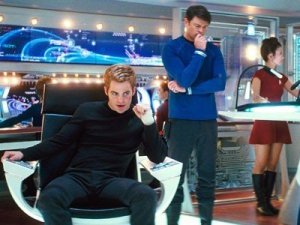
Damnit Jim, I’m a doctor not a sleazy, money-obsessed Hollywood producer!
There’s also a good chance that that $258 million is the most a Star Trek movie will ever make in North America, because the numbers have declined with each new installment, Into Darkness opening to $5 million less than Star Trek (2009) and now Beyond opening to $10 million less than Into Darkness. In an age of connected universe franchises capable of earning billions of dollars, the Star Treks of the world don’t even orbit the same conversation as The Avengers. They’re more like an Ant-Man (which, incidentally, also made more money worldwide than any of the Star Treks).
None of this, of course, is to say that the quality of a movie is determined by its box office earnings or the measure of a franchise is entirely expressed through its financial trajectory (or even that most good movies make the money and/or gain the recognition they should), but, at least in the grand scheme of Hollywood upstairs financing, Star Trek is a small fish in a big (but shrinking) pond, and even though a fourth film has already been confirmed, there’s more than an off chance that it might be the last for this generation of Star Trek movies.
Is it any good?
Back in April when I looked ahead at our upcoming reviews calendar, a real chill went down my spend as I looked at the movies coming out in the May to June transition. I try to go into movies (and most things) with an open mind, but it was hard to believe in movies like Teenage Mutant Ninja Turtles: Out of the Shadows, Warcraft, Independence Day: Resurgence, and Ghostbusters (2016). Week after week I watched those movies and wrote those disappointed reviews, but I was still very much hopeful that Star Trek Beyond would be the movie to turn the tide. And it did, and relief washed over me in an awesome wave.
Star Trek Beyond is the kind of movie that you can tell is probably going to be at least pretty good within the first 20 minutes. Right from the beginning, there was a level of confidence in its basic storytelling and structure that I found myself engaged pretty quickly, especially as the movie begins somewhere I’ve never seen with such a young crew — a captain lost in the position he’s worked so hard to earn. Now long after the dare that first sparked a real interest in Starfleet, Kirk’s no longer even sure if his work with Starfleet is a goal worth pursuing, and, similarly, his first officer, Spock (Zachary Quinto), has just received news that’s thrown his own future plans with Starfleet (and Uhura) into doubt. It’s the first time in this rebooted series that realistic, almost mundane character motivations are driving this narrative forward, again, making it easy to be engaged with the story, and because of Kirk and Spock’s misgivings, it’s also the first time that the two main, featured characters of the franchise have been allowed to leave more of the story to the rest of the crew.
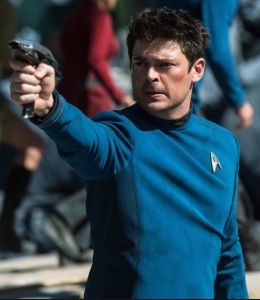
Damnit Jim, I’m a doctor, not a… actually, this phaser feels really good in my hands.
Pretty soon into their exploration of the mysterious nebula, our heroes are split up into heavily improvised teams based mostly on whose escape pod landed where, and in particular I was happy with the Spock/McCoy pairing, whose established sensibilities create natural friction but also reveal a deep, largely unspoken respect and affection for each other. Karl Urban’s portrayal of Dr. McCoy has always been notable for his almost freakish channeling of Deforest Kelley’s finer peculiarities, but thanks to his much bigger, much less frail physicality, he also gets to be a real badass in Beyond, so much so that I feel like his was probably the standout performance in the movie. Simon Pegg’s Scottie also receives a significant little adventure (and almost a suspicious amount of onscreen time considering Pegg was also the co-writer of the movie), teaming up with newcomer, Jayla (Sofia Boutella), who brings a lot of lightness to the movie despite her own tragic past and proficiency for beating everyone up.
Before the movie opened, John Cho’s Sulu received quite a bit more attention in Beyond than the character usually gets, mostly because of the news that the character would be gay, and whatever you may think of that development (which has been controversial for reasons other than you might think), mercifully, it’s not something the movie dwells on so much as it just is, just like McCoy is a crank or Kirk is a (so far heterosexual) horndog. In terms of the attention he gets in the movie, in the absence of Kirk, Chekov, Spock, McCoy, or Scottie, who all landed somewhere else, Sulu also gets a lot of time in de facto command of the remaining Enterprise crew who are taken captive by the villains of the movie, and it’s nice to see one of the most secondary characters in this series get their chance to shine, though it does feel a little bit like if Kirk had been in Sulu’s position, he would have led the group to safety much sooner in another of his trademark thrilling and/or daring plans with only a 4.3% statistical likelihood of success.
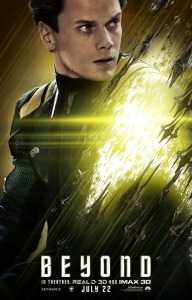
R.I.P.
Less well served, unfortunately, is Zoe Saldana’s Uhura, also with Sulu in the enemy camp. She gets opportunities to show her worth and mettle, but she’s far from the active participant in the crew’s [spoiler alert?] ultimate victory than most of her male counterparts are in the movie. The only major character who comes close to this lack of attention is Anton Yelchin’s Chekov, which is especially unfortunate since this’ll be the last time we see the character after the actor’s unexpected passing only a month ago. I instantly liked his rendition of Chekov the first moment I saw the character in Star Trek (2009), but of all the main characters, it does make some sense that he wouldn’t get that much to do, relegated to the role of Kirk’s sidekick, since I never really knew what he was doing on the bridge in the first place.
In other words, everybody did a good job, some with more to do than others, but if people had a problem with the Kelvin Timeline Trek, it usually wasn’t with the cast, nor was it with the movie’s action scenes, which, in Beyond, are huge and expansive, hard and fast, intricate and specific, and, mostly, just short of tiring. I would go so far as to say that the scene of the Enterprise’s invasion and subsequent crash was a better action scene than even Captain America: Civil War’s much-vaunted airport battle, and a later action scene is so good that it made me forgive and even embrace the franchise’s over use of the Beastie Boys’ “Sabotage”. But, again, a strong cast and good action scenes are merely what’s expected of these movies, and what takes Beyond up to a level that it might even please old school fans of the franchise is that there’s actually something going on at a pretty deep, ideological level between Captain Kirk and his nemesis in the movie, Krall (Idris Elba), and it’s enough to make you actively think about the movie’s themes, though, unfortunately, a lot of those thoughts only manifest all once at the movie’s end with a hugely impactful info dump that could’ve been better seeded throughout.
So should I see it?
I was never a fan of J.J. Abrams’ Star Trek as a reboot of The Original Series, I was a fan of it as a piece in and of itself. Honestly, it’s hard for me to understand how anyone could like these movies as anything more than a funhouse mirror reflection of the old TV shows because feature-length, franchise movies that come out every few years generally aren’t the right place for episodic stories about Abraham Lincoln simulacrums or the captain thinking he’s a horse or tough questions about morality that continue to stand out as some of the best pieces of science fiction even now, almost fifty years later.
The easy thing for me to say about Star Trek Beyond is that it’s the best action movie of the year, ahead of Captain America: Civil War, Deadpool, or Batman v Superman, and for me, it’s not even close. Though it’s a bit long in the end, Star Trek Beyond‘s biggest asset is its pacing, moving briskly but not exhaustively, never giving you a chance to rest, while leaving you just enough room to be able to consider what’s going on without overthinking it. Unfortunately, while a lot of the story elements come together very well, the main villain’s story is a bit rushed in the end, and the hard thing for me to say is that, when you break Star Trek Beyond down critically, it’s easy to see that it’s not as perfect as it may have felt while watching it.
Thom’s Star Trek Beyond final score


On the Edge
- Kirk mentions how his dad had the same dirt bike he finds on the planet they crash on. Is he talking about his stepdad (who he seemed to hate)?
- [spoilers] We can’t say for sure how often the two Spocks met outside of what we saw in the movies, but given how much time young Kirk spent with Ambassador Spock and that that Spock was instrumental in getting Kirk command of the Enterprise, shouldn’t Kirk have been just as torn up about Ambassador Spock’s death as young Spock was?
- [more spoilers] On another note, isn’t it kind of tragic to think that Ambassador Spock died never having returned to his own timeline?
- Oh sure, it’s fine that Sulu is gay, but apparently it’s not okay for him to date, marry, or adopt outside of his own race?
- A big shout out to Landmark Cinemas for how they handled a difficult situation when the theatre’s fire alarm went off! What was nothing more than a minor annoyance resulted in me getting a free admission pass!

